|
. . . . AND THOSE AROUND TRING
CHAPTER XVI.
LOCAL
WINDMILLS TO VISIT
PITSTONE POST MILL
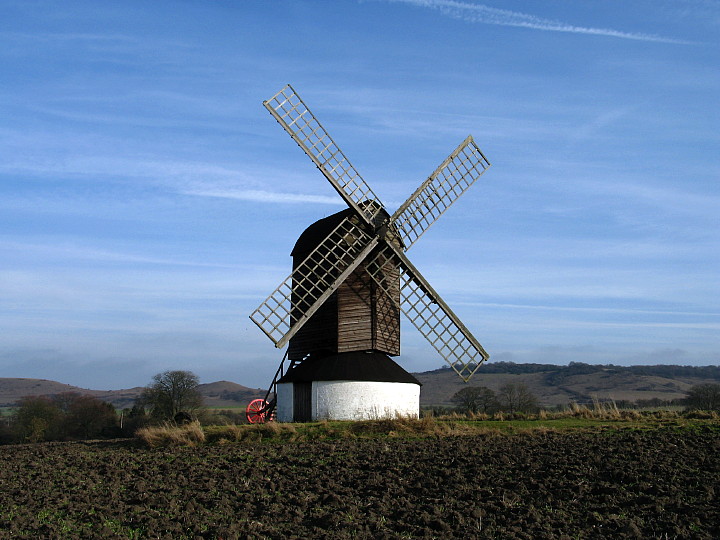
Location: near to the junction of the B488 and B489
OS Sheet 165; SP 945 157
Pitstone mill is described in Chapter 6. Although in
mechanical working order, the mill is now a static exhibit managed
by the National Trust. It may be approached and viewed from the
outside at any time, but public openings are generally on Sunday
and Bank Holiday afternoons during the summer months.
BRILL POST MILL
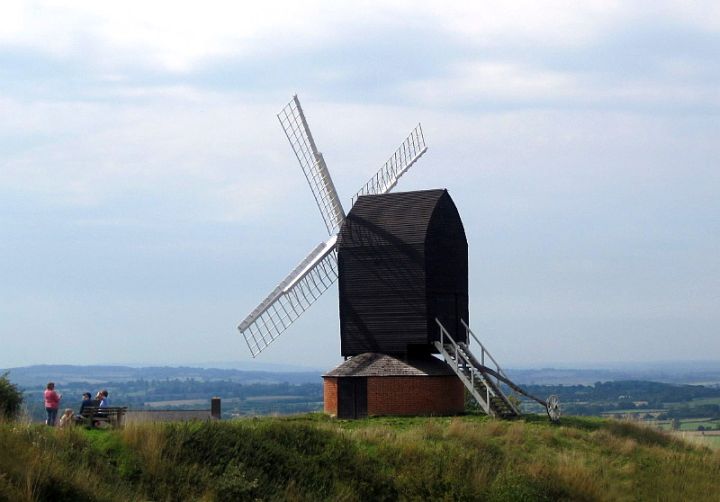
Location: about ½ mile N.W. of the town centre
OS Sheet 165; SP 652 142
A 17th century post mill, similar in style and vintage to that at
Pitstone and possibly by the same millwright. The windmill stands on open ground at the end of Windmill Street, its
elevated situation giving a fine view of the surrounding
countryside. It may be approached and viewed from the outside at any
time, but public openings are generally on Sunday afternoons during
the summer months.
LACEY GREEN SMOCK MILL

Location: behind ‘The Whip’ public house;
OS Sheet 165; SP 819 008
Lacey Green smock mill lies about two miles
south-east of Princes Risborough. It is believed to date from 1650,
making it Britain’s oldest smock mill. Judging by old photographs,
the mill was in a ruinous and derelict condition in 1970, but has
since been restored, quite miraculously, by a dedicated team of
windmill preservationists. The windmill is open to the public
on Sundays and Bank Holiday Mondays, from May to September, and
operates on some occasions.
QUAINTON TOWER MILL
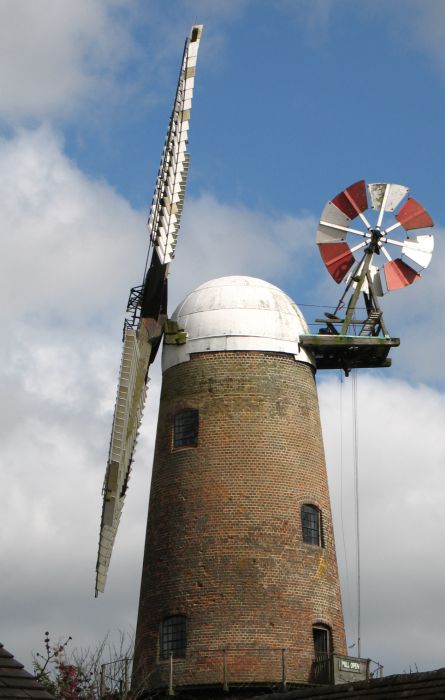
Location: off Upper Street, N. of town centre;
OS Sheet 165; SP 746 202
Also known as Banner Mill, this 6-storey, brick-built tower mill
dates from 1832. It remained in operation as a
windmill until 1881 when steam replaced wind power; milling had
ceased altogether by 1900. Under the tender care of the Quainton
Windmill Society, the derelict mill was restored over a period of 23
years, returning to full operation in 1997. The windmill, which
overlooks the picturesque village green, is open on Sunday mornings
throughout the year and operates when wind conditions are
favourable. The George and Dragon public house (on the Green) serves
food, while the nearby Quainton Railway Centre is another place of
interest worth a visit. Please confirm opening times before
visiting.
CHINNOR POST MILL
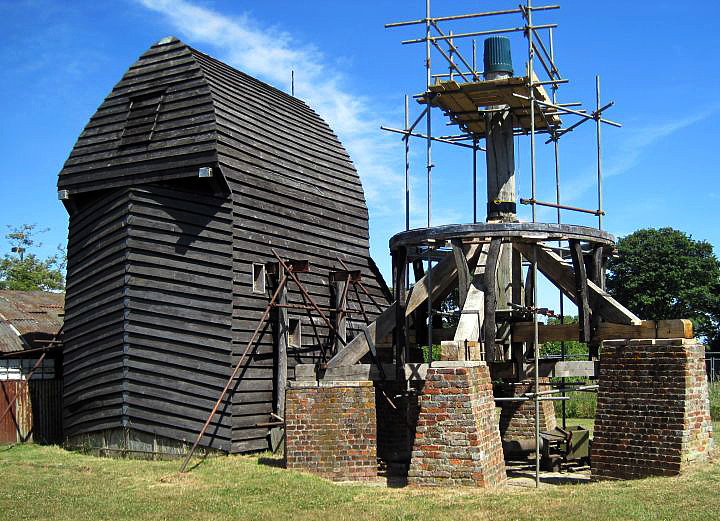
Location: in Mill Lane (junction B4009 & B4445)
OS Sheet 165; SP
749 010
Chinnor post mill was built in 1789 and ground wheat
into flour until 1923. By 1967 she was derelict and was pulled down
to make way for housing. Fortunately, much of the structure was
saved and the mill is presently being reconstructed on a site near
to its original home by a dedicated team of volunteers.
The mill’s construction is unusual, it having three (rather than the
usual two) cross-trees, which require six ‘quarter bars’ and brick
piers. Curved struts support a curb ring that stabilizes the bottom
of the buck (superstructure).
A visit to Chinnor mill provides a valuable opportunity to see a
post mill in the course of construction and to inspect the post,
quarter bars and piers, which are often difficult to see clearly
when enclosed in a roundhouse. The mill can be viewed externally at any time.
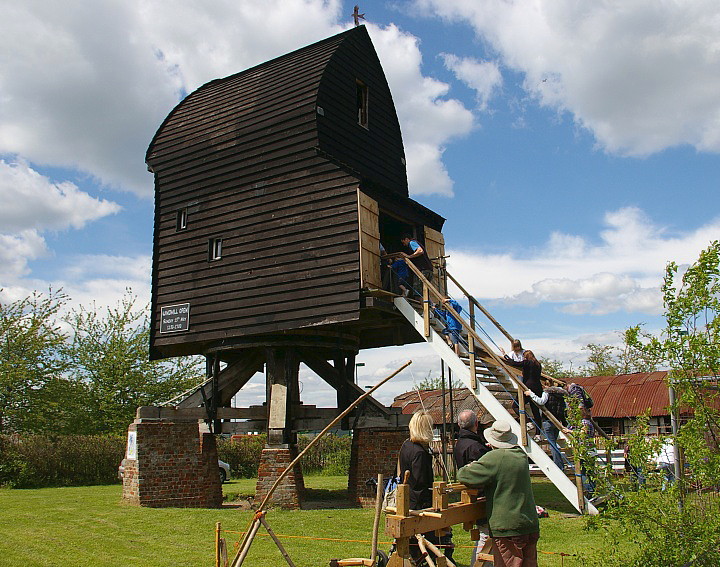
Since writing the original entry for Chinnor
Post Mill, there have been developments. The buck was lifted onto
its post in 2011, and the steps and fantail have been rebuilt. The
sails are being made professionally and will be fitted in the summer
of 2014. Work continues on the mill’s machinery with the aim of
producing flour.
You can see a video clip of the buck being
lifted into position on
YouTube.
――――♦――――
APPENDIX
OTHER LOCAL WINDMILLS NOT OPEN TO THE PUBLIC
EDLESBOROUGH TOWER MILL
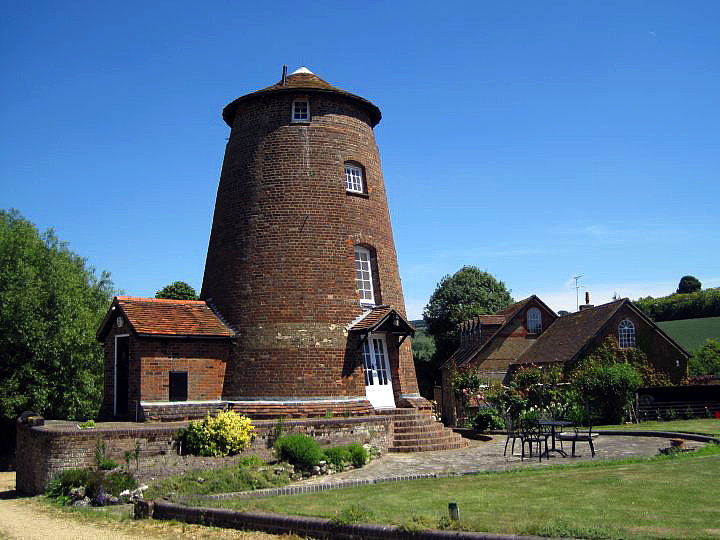
Location about ¼ mile N.W. of Edlesborough Hill;
OS Sheet 165; SP 982 192.
Edlesborough tower mill, also known as Simmons mill after
the family who owned it over many generations, is located on the
eastern side of the village on the Ouzel, astride the Bucks/Beds
border. A private drive leads to the mill, which is not visible from
the highway. The owner believes the mill was built c.1790; the only
references to it appear in A History of the County of Bedford:
Volume 3 (1912) . . . .
“The village is watered by numerous
streams, which rise at Well Head and on the Dunstable Downs, and
find their way eventually to the Ouzel, which forms the western
boundary. On its banks, slightly north of Edlesborough Hill, stands
Edlesborough Mill. Steam is employed here when insufficiency
of water prevents that power being utilized. On the other side
of the stream, in Buckinghamshire, is an old windmill, whose sails
were blown down seventeen years ago [c.1895].”
. . . . and English Windmills Vol. II. (1932) records that
. . . . “it has no sails and is derelict”
(fig. 13.1). The present owner has restored
the body of the mill, which now stands in carefully tended grounds,
nicely set off against the Ouzel and the landscaped millpond and
mill race of its former neighbour, the watermill — a delight to see. Today, the old windmill is spending its retirement as a holiday
flat
to let.
DOOLITTLE COMBINED WIND
AND WATER MILL
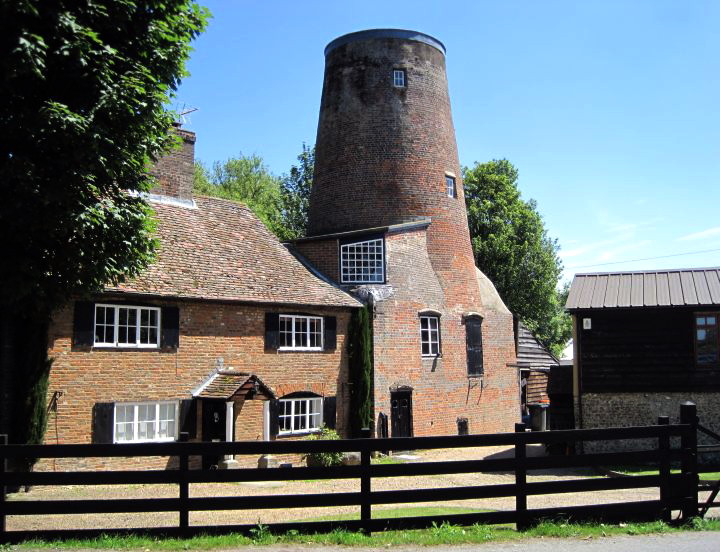
Location on Doolittle Lane 1¼ miles S.E. of Eaton Bray church.
OS Sheet 165; SP 990 202.
Doolittle mill is thought to have been built between 1815
and 1825. It is a rare example of a combined wind and water mill,
the water mill being situated in the first two floors with the
windmill in the brick tower above. The windmill ceased operation in
1868 when its sails were blown off and a steam engine was then
installed. It closed in 1921. Today, the mill is a private dwelling
with some commercial premises situated in the grounds. It can be
seen from the public highway.
Local folklore has it that Doolittle mill acquired its name — a
corruption of “Do Little” — because it is sited at the head of a
stream and hence, in dry weather when water flow was low, the water
mill was not capable of doing much work. It was then that recourse
was made to its sails and, later, to the steam engine.
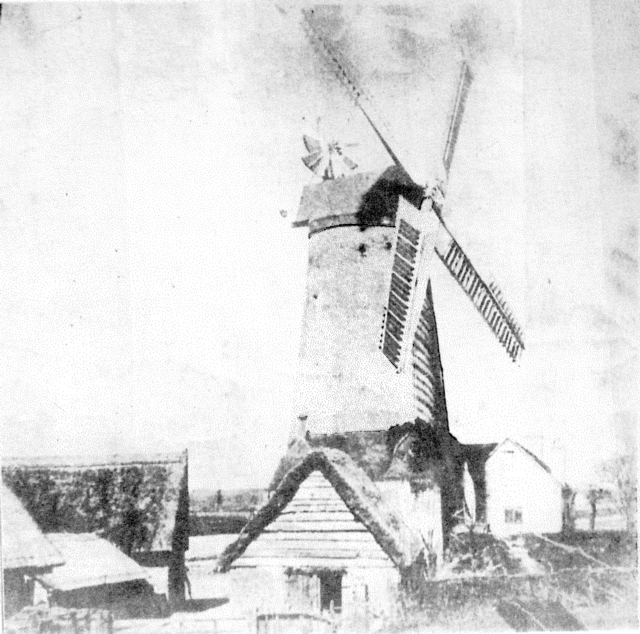
Doolittle mill pre-1868 |